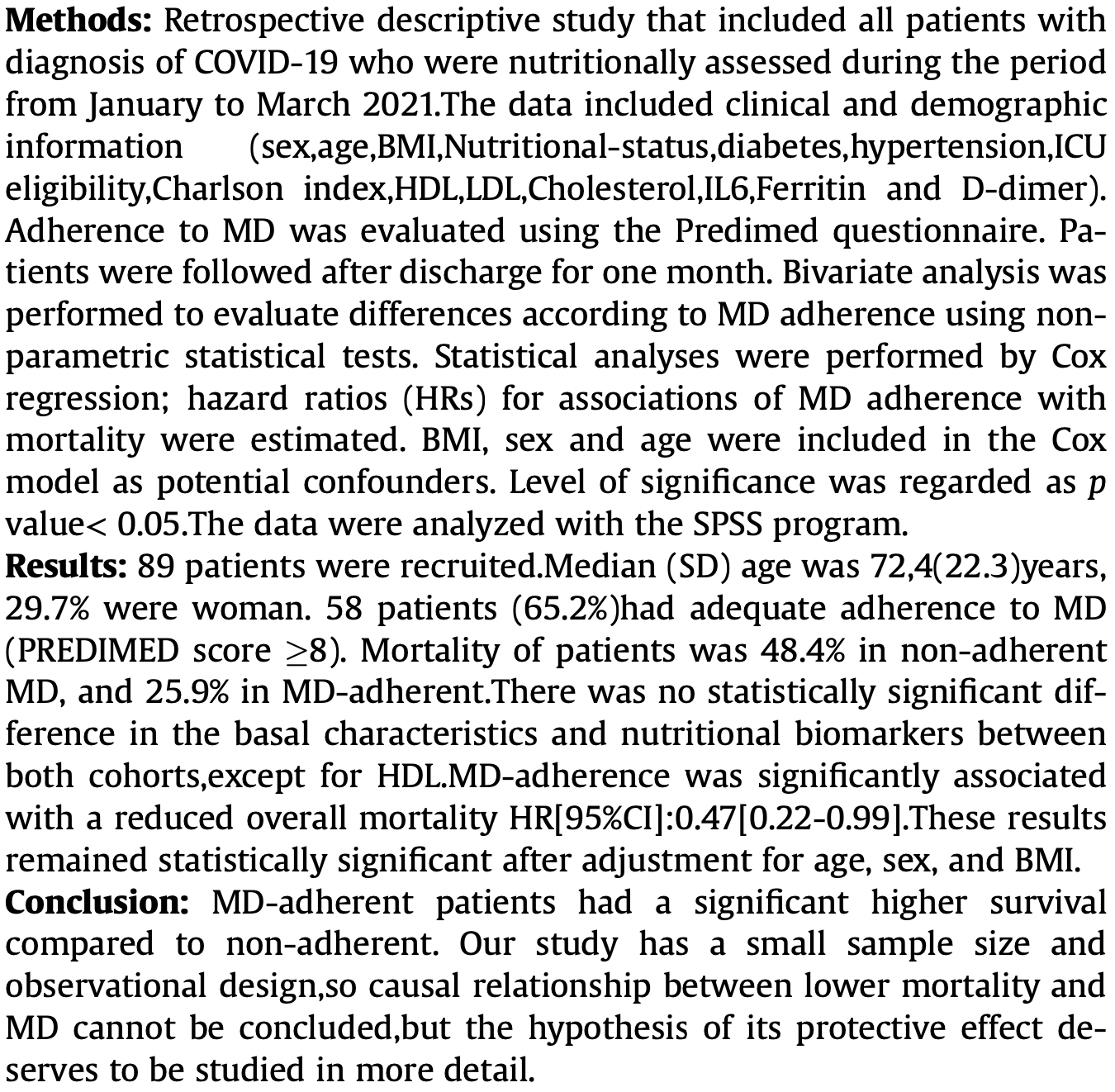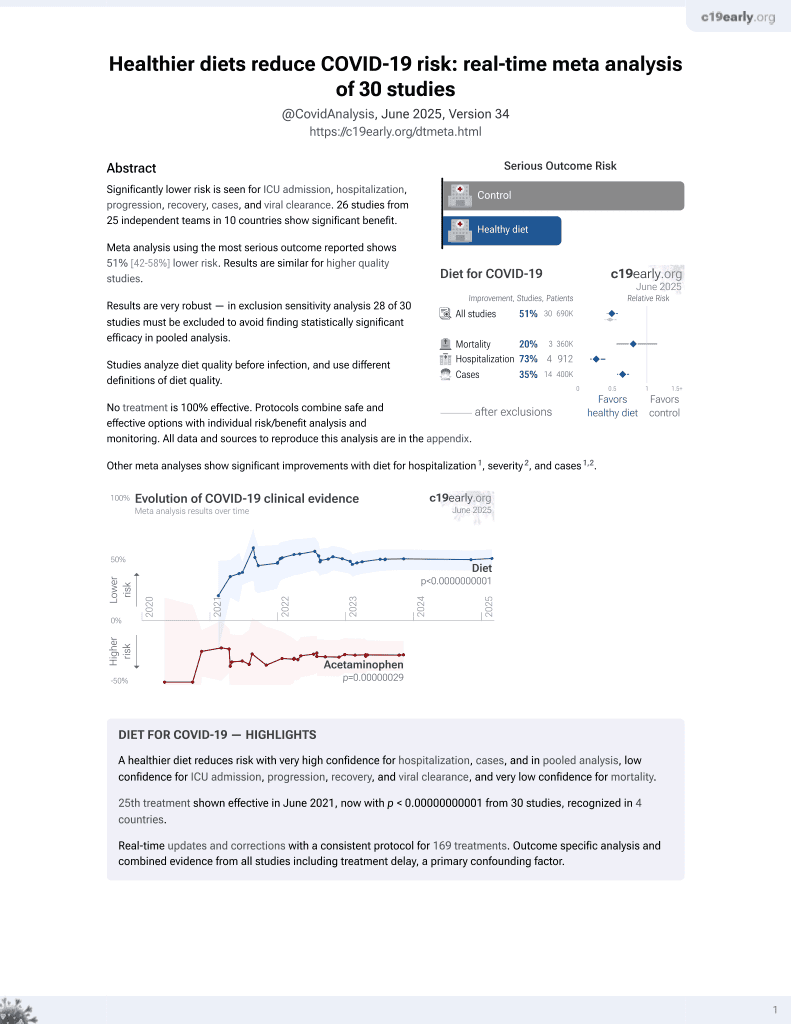
Influence of mediterranean diet on survival from covid-19 disease
et al., Clinical Nutrition ESPEN, doi:10.1016/j.clnesp.2021.09.606, Dec 2021
Diet for COVID-19
26th treatment shown to reduce risk in
June 2021, now with p < 0.00000000001 from 30 studies, recognized in 4 countries.
No treatment is 100% effective. Protocols
combine treatments.
6,400+ studies for
210+ treatments. c19early.org
|
Retrospective 89 COVID-19 patients in Spain, showing lower mortality with adherence to the Mediterranean diet.
This study is excluded in the after exclusion results of meta-analysis:
unadjusted results with no group details.
|
risk of death, 53.0% lower, HR 0.47, p = 0.049, higher quality diet 58, lower quality diet 31.
|
| Effect extraction follows pre-specified rules prioritizing more serious outcomes. Submit updates |
Magaña et al., 31 Dec 2021, retrospective, Spain, peer-reviewed, 6 authors.
-Estruch R, Martínez-Gonz alez MA, Corella D, et al. Effects of a Mediterranean-style diet on 2-Detopoulou P, Demopoulos CA, Antonopoulou S. Micronutrients, Phytochemicals and Mediterranean Diet: A Potential Protective Role against COVID-19 through Modulation of PAF Actions and Metabolism
Rationale: Evaluate the effects of the Mediterranean Diet (MD) on mortality from COVID-19 disease in hospitalized patients with severe disease. Methods: Retrospective descriptive study that included all patients with diagnosis of COVID-19 who were nutritionally assessed during the period from January to March 2021.The data included clinical and demographic information (sex,age,BMI,Nutritional-status,diabetes,hypertension,ICU eligibility,Charlson index,HDL,LDL,Cholesterol,IL6,Ferritin and D-dimer). Adherence to MD was evaluated using the Predimed questionnaire. Patients were followed after discharge for one month. Bivariate analysis was performed to evaluate differences according to MD adherence using nonparametric statistical tests. Statistical analyses were performed by Cox regression; hazard ratios (HRs) for associations of MD adherence with mortality were estimated. BMI, sex and age were included in the Cox model as potential confounders. Level of significance was regarded as p value< 0.05.The data were analyzed with the SPSS program. Results: 89 patients were recruited.Median (SD) age was 72,4(22.3)years, 29.7% were woman. 58 patients (65.2%)had adequate adherence to MD (PREDIMED score 8). Mortality of patients was 48.4% in non-adherent MD, and 25.9% in MD-adherent.There was no statistically significant difference in the basal characteristics and nutritional biomarkers between both cohorts,except for HDL.MD-adherence was significantly associated with a reduced overall mortality HR[95%CI]:0.47[0.22-0.99].These results remained statistically significant after adjustment for age, sex, and BMI. Conclusion: MD-adherent patients had a significant higher survival compared to non-adherent. Our study has a small sample size and observational design,so causal relationship between lower mortality and MD cannot be concluded,but the hypothesis of its protective effect deserves to be studied in more detail.
DOI record:
{
"DOI": "10.1016/j.clnesp.2021.09.606",
"ISSN": [
"2405-4577"
],
"URL": "http://dx.doi.org/10.1016/j.clnesp.2021.09.606",
"alternative-id": [
"S2405457721009293"
],
"author": [
{
"affiliation": [],
"family": "Magaña",
"given": "M. Miranda",
"sequence": "first"
},
{
"affiliation": [],
"family": "Fernández",
"given": "L. Rey",
"sequence": "additional"
},
{
"affiliation": [],
"family": "Cacace",
"given": "I.",
"sequence": "additional"
},
{
"affiliation": [],
"family": "Goitia",
"given": "B. Tortajada",
"sequence": "additional"
},
{
"affiliation": [],
"family": "Felipe",
"given": "V. Faus",
"sequence": "additional"
},
{
"affiliation": [],
"family": "Osinaga",
"given": "J. Abilés",
"sequence": "additional"
}
],
"container-title": "Clinical Nutrition ESPEN",
"container-title-short": "Clinical Nutrition ESPEN",
"content-domain": {
"crossmark-restriction": false,
"domain": []
},
"created": {
"date-parts": [
[
2021,
11,
30
]
],
"date-time": "2021-11-30T17:12:30Z",
"timestamp": 1638292350000
},
"deposited": {
"date-parts": [
[
2022,
4,
6
]
],
"date-time": "2022-04-06T00:06:58Z",
"timestamp": 1649203618000
},
"indexed": {
"date-parts": [
[
2022,
4,
6
]
],
"date-time": "2022-04-06T00:48:03Z",
"timestamp": 1649206083511
},
"is-referenced-by-count": 0,
"issued": {
"date-parts": [
[
2021,
12
]
]
},
"language": "en",
"license": [
{
"URL": "https://www.elsevier.com/tdm/userlicense/1.0/",
"content-version": "tdm",
"delay-in-days": 0,
"start": {
"date-parts": [
[
2021,
12,
1
]
],
"date-time": "2021-12-01T00:00:00Z",
"timestamp": 1638316800000
}
}
],
"link": [
{
"URL": "https://api.elsevier.com/content/article/PII:S2405457721009293?httpAccept=text/xml",
"content-type": "text/xml",
"content-version": "vor",
"intended-application": "text-mining"
},
{
"URL": "https://api.elsevier.com/content/article/PII:S2405457721009293?httpAccept=text/plain",
"content-type": "text/plain",
"content-version": "vor",
"intended-application": "text-mining"
}
],
"member": "78",
"original-title": [],
"page": "S758",
"prefix": "10.1016",
"published": {
"date-parts": [
[
2021,
12
]
]
},
"published-print": {
"date-parts": [
[
2021,
12
]
]
},
"publisher": "Elsevier BV",
"reference-count": 0,
"references-count": 0,
"relation": {},
"resource": {
"primary": {
"URL": "https://linkinghub.elsevier.com/retrieve/pii/S2405457721009293"
}
},
"score": 1,
"short-title": [],
"source": "Crossref",
"subject": [
"Nutrition and Dietetics",
"Endocrinology, Diabetes and Metabolism"
],
"subtitle": [],
"title": "Influence of mediterranean diet on survival from covid-19 disease",
"type": "journal-article",
"volume": "46"
}
